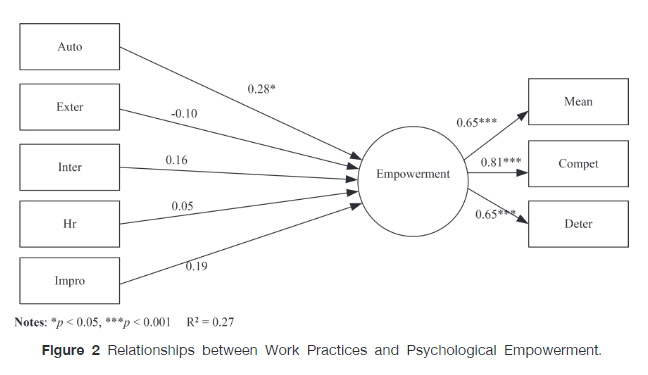EFFECT OF ORGANIZATIONAL CULTURE ON PSYCHOLOGICAL EMPOWERMENT AMONG EMPLOYEES WITH JOB INSECURITY: A CASE OF PROFESSIONAL FOOTBALL COACHES IN THAILAND
Main Article Content
Abstract
Purpose The purpose of this study was to investigate the relationship between organizational culture in terms of work practices and psychological empowerment among professional football coaches who tend to face high level of job insecurity condition.
Methods This study employed a survey among 127 Thai professional football coaches. Measures were adopt from previous studies and were back-translated. Structural Equation Model (SEM) was utilized to test hypothesis.
Results Results show that organizational culture conceptualized by five work practices is positively and significantly associated with football coaches’ perception of psychological empowerment. Specifically, only work practice of autonomy is found to be positively and significantly associated with psychological empowerment.
Conclusion We conclude that organizational culture tends to affect psychological empowerment positively. In particular, work practice of autonomy has tendency to affect psychological empowerment in a positive manner. The results, in addition to insights regarding the context of organizational culture and empowerment in the football management area, have implications for those attempting to encourage their staff to feel more persistent and intrinsically motivated toward insecure and pressure job conditions.
Article Details
References
Boyce, A.S., Nieminen, L.R.G., Gillespie, M.A., Ryan, A.M., and Denison, D.R. (2015). Which comes first, organizational culture or performance? A longitudinal study of causal priority with automobile dealerships. Journal of Organizational Behavior, 36, 339-359.
Bridgewater, S. (2010). Football Management, Palgrave Macmillan, New York, NY.
Conger, J.A., and Kanungo, R.N. (1988). The empowerment process: Integrating theory and practice. The Academy of Management Review, 13(3), 471-482.
Dobson, S., and Goddard, J. (2001). The Economics of Football, Cambridge University Press, Cambridge.
Ferguson, A., and Moritz, M. (2015). Leading: Alex Ferguson with Michael Moritz. Hodder and Stroughton Ltd., London.
Foster, G., Greyser, S.A., and Walsh, B. (2006). The Business of Sports: Text and Cases on Strategy and Management, Thomson South-Western, London.
Hair, J.F., Black, W.C., Babin, B.J., and Anderson, R.E. (2010). Multivariate Data Analysis: A Global Perspective, (7th ed.). Pearson Education, New Jersey.
Hamil, S., and Chadwick, S. (2010). Managing Football: An International Perspective. Elsevier, London.
Heaney, C.A., Israel, B.A, and House, J.S. (1994). Chronic job insecurity among automobile workers: Effects on job satisfaction and health. Social Science and Medicine, 38(10), 1431-37.
Hofstede, G. (2001). Culture’s Consequences: Comparing Values, Behaviors, Institutions, and Organizations Across Nations. Thousand Oaks, CA: Sage.
Kelly, S. (2008). Understanding the role of the football manager in Britain and Ireland: A Weberian approach. European Sport Management Quarterly, 8(4), 399-419.
Lee, C., Huang, G.H., and Ashford, S.J. (2018). Job insecurity and the changing workplace: Recent developments and the future trends in job insecurity research. Annual Review of Organizational Psychology and Organizational Behavior, 5, 9.1-9.25.
MacIntosh, E.W., and Doherty, A. (2010). The influence of organizational culture on job satisfaction and intention to leave. Sport Management Review, 13, 106-117.
MacIntosh, E., and Doherty, A. (2005). Leader intentions and employee perceptions of organizational culture in a private fitness corporation. European Sport Management Quarterly, 5(1), 1-22.
Nissen, R. (2016). Hired to be fired? Being a coach in Danish professional football. International Journal of Sports Science and Coaching, 11(2), 137-148.
Ogbonna, E., and Harris, L.C. (2014). Organizational culture perpetuation: A case study of an English Premier League football club. British Journal of Management, 25, 667-686.
Schein, E.H. (2010). Organizational Culture and Leadership, (4th ed.). Jossey-Bass, New Jersey.
Seibert, S.E., Wang, G., and Courtright, S.H. (2011). Antecedents and consequences of psychological and team empowerment in organizations: A meta-analytic review. Journal of Applied Psychology, 96(5), 981-1003.
Skinner, J., and Stewart, B. (2017), Foundations of Sport Management: Organizational Behaviour in Sport, Routledge, New York, NY.
Spreitzer, G.M. (1995). Psychological empowerment in the workplace: Dimensions, measurement, and validation. Academy of Management Journal, 38(5), 1442-1465.
Sverke, M., Hellgren, J., and Naswall, K. (2002). No security: A meta-analysis and review of job insecurity and its consequences. Journal of Occupational, Health, and Psychology, 7, 242-264.
Van den Berg, P.T., and Wilderom, C.P.M. (2004). Defining, measuring, and comparing organisational cultures. Applied Psychology: An International Review, 53(4), 570-582.
Wilderom, C.P.M., Van den Berg, P.T., and Wiersma, U.U. (2012). A longitudinal study of the effects of charismatic leadership and organizational culture on objective and perceived corporate performance. The Leadership Quarterly, 23, 835-848.


